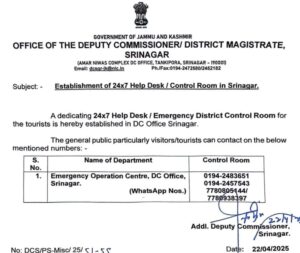Pahalgam Terror Attack: India’s Five Point Action Plan against Pakistan

Following the April 22, 2025, terror attack in Pahalgam, Jammu and Kashmir, which killed 26 people, mostly tourists, India implemented a five-point action plan targeting Pakistan, attributing the attack to Pakistan-backed militant groups, specifically The Resistance Front (TRF), an offshoot of Lashkar-e-Taiba (LeT). The decisions, finalized after a Cabinet Committee on Security (CCS) meeting chaired by Prime Minister Narendra Modi on April 23, 2025, are as follows:
- Suspension of the Indus Waters Treaty (IWT): India suspended the 1960 IWT, which governs the sharing of the Indus River system, effective immediately, until Pakistan “credibly and irrevocably abjures support for cross-border terrorism.” This move significantly impacts Pakistan’s agriculture and water security, as it relies on about 80% of the Indus water flow.
- Closure of the Attari-Wagah Border: The integrated Attari checkpost, a key trade and passenger crossing, was closed immediately, disrupting trade worth ₹3,886.53 crore annually, including exports like vegetables and imports like dry fruits. The closure is set to continue until at least May 1, 2025.
- Cancellation of SAARC Visas for Pakistani Nationals: India revoked the SAARC Visa Exemption Scheme for Pakistani citizens, ordering those in India on such visas to leave within 48 hours. Other Pakistani nationals were given until May 1, 2025, to depart.
- Expulsion of Pakistani Military Advisors: Defence, naval, and air advisors at the Pakistani High Commission in New Delhi were declared persona non grata and given one week to leave. India reciprocally withdrew its own advisors from Islamabad, annulling these posts in both missions.
- Reduction of Diplomatic Missions: The strength of both countries’ high commissions will be reduced from 55 to 30 personnel by May 1, 2025, with five support staff for defense advisors also withdrawn.
These measures reflect India’s intent to impose diplomatic and economic costs on Pakistan, which it accuses of supporting cross-border terrorism. The attack, one of the deadliest since the 2019 Pulwama bombing, prompted widespread protests in India and international condemnation, with leaders like US President Donald Trump and Russian President Vladimir Putin expressing solidarity. Pakistan’s National Security Committee, chaired by Prime Minister Shehbaz Sharif, was scheduled to meet on April 24, 2025, to formulate a response, with Defence Minister Khawaja Asif warning of retaliation if India escalates further.
Analysts suggest India’s response aims to reassert deterrence while avoiding immediate military escalation, given the nuclear capabilities of both nations. However, the suspension of the IWT and border closure could exacerbate tensions, with potential economic fallout for Pakistan’s agriculture and trade. Some Pakistani officials, like former minister Shireen Mazari, called India’s actions “predictable” and accused it of violating the IWT historically, while others warned of a possible “Balakot-type” Indian military response.
India’s actions are based on intelligence suggesting Pakistani involvement, including the presence of Pakistani nationals among the attackers. The situation remains volatile, with India conducting manhunts for the perpetrators and maintaining high security in Jammu and Kashmir.





